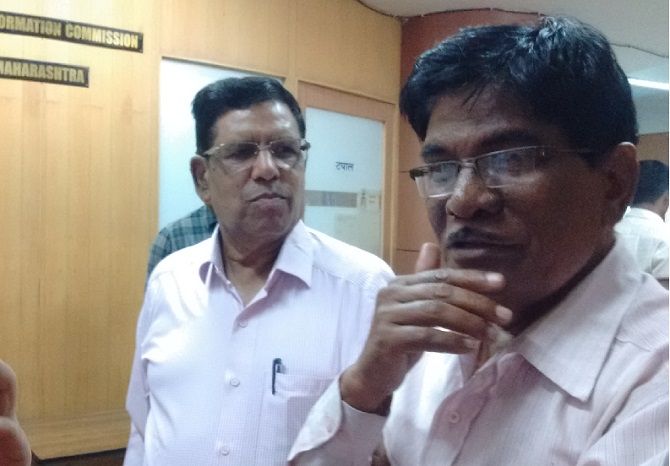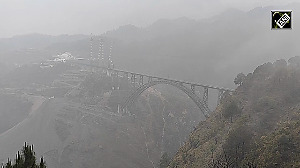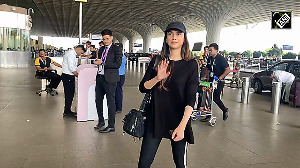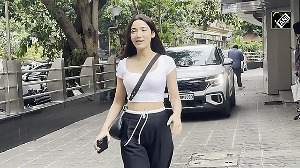He is neither a victim of the violence that broke out at Bhima Koregaon on January 1, 2018 nor an eye-witness to it.
Yet, Bhimrao Bansod testified for a full 14 days before the judicial commission of inquiry set up to inquire into the violence.
Jyoti Punwani reports.

He is neither a victim of the violence that broke out at Bhima Koregaon on January 1, 2018 nor an eye-witness to it.
Yet, Bhimrao Bansod testified for a full 14 days before the judicial commission of inquiry set up to inquire into the violence.
January 1, 2018 marked the 200th anniversary of the battle of Bhima Koregaon, wherein the Peshwas were defeated by the British with the help of Mahars.
As lakhs of Dalits converged at Bhima Koregaon that day, violence broke out leaving one Maratha dead, many Dalits injured and large scale destruction of property.
A judicial commission was set up to investigate the violence.
Bansod, 65, bears the distinction of having testified the longest before the Bhima Koregaon Commission.
His testimony started in September 2018 and wound up in June 2019.
The Dalit activist was part of a four-member fact-finding team led by Dr Bharat Patankar, that visited the scene of violence on January 4, 2018.
Bansod submitted the team's report to the commission.
The findings mentioned in the report were contested by all the lawyers appearing before the Commission: Those who represented Hindutva groups and individuals, and also the government counsel.
The fact-finding report did not say anything different from what eye-witnesses and victims of the violence have told the commission.
Like them, it also ascribed the Bhima Koregaon violence on January 1, 2018 to 'mobs egged on by Hindu right-wing organisations'.
Yet, Bansod was grilled far more than were these victims and eye-witnesses.
Why?
Bansod told this correspondent that this was probably because their team was the first to present a report on the incidents.
However, the reason seems more to have to do with the political background of the fact-finding team, and particularly Bansod's background.
Bansod, who described himself as an Ambedkarite, listed a number of organisations with which he was associated, foremost among them being the Jaati Mukti Andolan headed by Prakash Ambedkar.
However, advocates Niteen Pradhan, who represents Milind Ekbote, Pradeep Gavade, who represents Sagar Shinde of the Lokshahi Jagar Manch, and Shishir Hiray who represents the Maharashtra government, alleged that Bansod was a Communist.
Referring to an essay by Bansod in which he had written about the need for a 'revolutionary political party' to take over political power, Hiray described him as a Maoist sympathiser, who had wanted to help the Maoists who he said had organised the Elgar Parishad on December 31, 2017 in Pune.
The two main organisers of the Elgar Parishad were retired judges B G Kolse-Patil and P B Sawant, former Press Council of India chairman.
But the Maharashtra government has been propounding the theory that Maoists had organised the Elgar Parishad, and that the 'provocative speeches' made there were the cause of the violence that broke out the next day at Bhima Koregaon.
A number of well-known human rights defenders from across the country, most of whom did not even attend the Parishad, have been arrested on the charge of being Maoists and part of this 'conspiracy' to instigate violence at Bhima Koregaon.
Bansod acknowledged his association with the Lal Nishan Party, headquartered in Mumbai, which he said, believes in the teachings of Marx, Lenin, Stalin ("partly"), and Dr Ambedkar.
Hiray pointed out that Internet references to Bansod's writings referred to him as 'Comrade'.
However, Bansod said he was addressed so because he was a trade unionist.
Pradhan asked him if the members of the fact-finding team were 'Socialists, Leftists, Marxists', to which Bansod replied that they believed in 'progressive' thought.
Did that imply that they did not believe in 'dharma and parampara' (religion and traditions), asked Pradhan.
**

Bansod's political leanings were also used by these lawyers to discredit the findings of his fact-finding report.
Hiray directly linked the findings of the report to Bansod's political leanings.
'In order to support the Maoist and Naxals, you have published a one-sided and biased report,' he said.
The report, suggested Pradhan, had been written in a way to 'protect Prakash Ambedkar and his Marxist followers who held Elgar Parishad.'
He asked Bansod whether he was a supporter of Prakash Ambedkar because he admired the latter's 'aggressive' approach towards political issues.
Did he believe that the Brahmins 'should be blamed for all ills of society and the other castes were their victims?'" asked Pradhan.
'Not Brahmins, but Brahminism is to blame,' replied Bansod calmly.
Indeed, throughout his lengthy cross-examination, Bansod remained composed and was rarely at a loss for an answer, drawing admiration from Justice Jaynarayan Patel, who heads the two-member Commission.
The lawyers could pinpoint one error in the fact-finding report.
The report said one Abdulbhai was the owner of the New Taj Auto garage that had been attacked on January 1.
In fact, the garage was owned by Tabassar Suleman Shah, pointed out advocate Vijay Sawant, representing the Vivek Vichar Manch, a Hindutva think-tank.
The report said Hindutvawadi groups had attacked the garage.
But advocate Niteen Pradhan alleged that the assailants had been carrying blue flags and shouting 'Jai Bhim'.
Bansod replied that the locals had told his team that Abdulbhai was the owner.
He wasn't there at the time so the team could not meet him.
Even as the lawyers accused him of bringing out a report aimed at 'misleading and instigating people on grounds of caste with the sole object of creating animosity and hatred among one section of society -- Dalits -- and suppressing the damage and loss suffered by other members of society, to suit his political agenda,' Bansod stood by the team's findings that it was saffron groups who were responsible for the violence.
He admitted that the team did not verify their findings with the police, and that their findings were based on hearsay.
They went by what people told them.
Much was also made by these lawyers of the fact that Bharat Patankar had not signed the report.
Though Bansod explained that Patankar had not been available in Pune when everyone else signed it, and had authorised someone else to sign on his behalf, the lawyers insisted that the reason was because Patankar did not agree with its conclusions.
They also referred to an interview of Patankar wherein he stated that the Elgar Parishad was a 'mistake' and that it had given a different direction to the Bhima Koregaon gathering scheduled for the next day.
However, when this correspondent spoke to Patankar, he repeated the explanation given by Bansod, and denied having called the Elgar Parishad a mistake.
As the witness who has testified the longest before the Commission, what are Bansod's view about it?
"I found both members of the commission impartial," said Bansod.
"They would not let the lawyers ask irrelevant or repetitive questions."
The veteran activist -- he told the commission that he had been expelled from his RSS-run Yavatmal college after he protested against the shortage of food in the students' hostel -- wasn't upset at having been subjected to such lengthy cross-examination.
"These lawyers are paid by their clients to prove a certain theory. So naturally they will ask such questions."
His own lawyers, B G Bansode and Kiran Channe, he said, had not charged him at all.
However, the question needs to be asked: In what way did the 14 days of Bhimrao Bansod's cross-examination help the commission achieve its goal?











